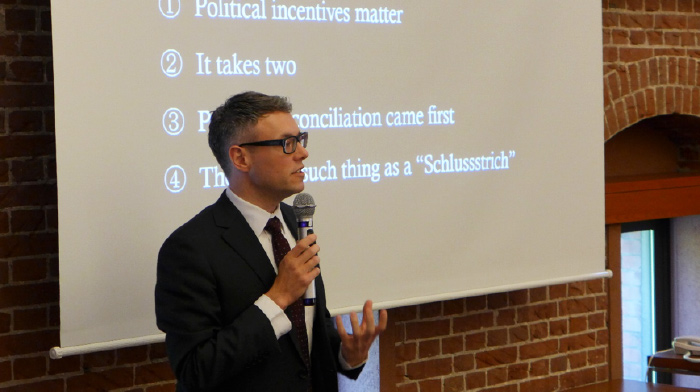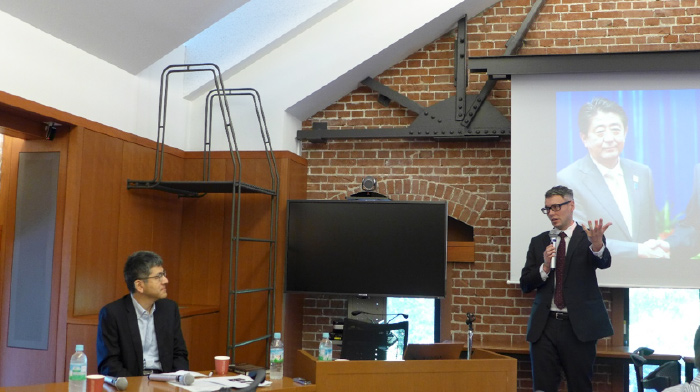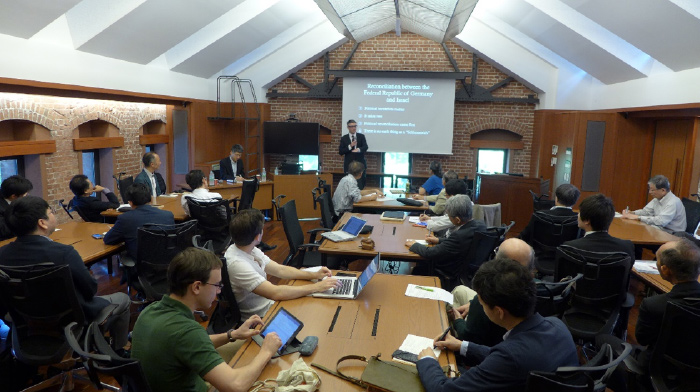SSU Forum with Associate Professor Todd H. Hall
| Date: | Thursday, May 11 2017, 10:30-12:00 |
|---|---|
| Venue: | Conference Room, 3rd Floor, Ito International Research Center |
| Subject: | “Studying Emotional Politics in International Relations.” |
| Lecture: | Todd H. Hall, Associate Professor, University of Oxford, Department of Politics and International Relations |
| Language: | English |
| Hosted by: | Security Studies Unit, Policy Alternatives Research Institute, the University of Tokyo |
The SSU was delighted to host Dr. Todd H. Hall, Associate Professor at the University of Oxford (St Anne’s College), Department of Politics and International Relations, who delivered a talk entitled “Emotions and International Relations”.
The event was opened by Professor Kiichi Fujiwara, Director of the Policy Alternatives Research Institute of UTokyo and head of the SSU. Professor Fujiwara greeted the guest and the attendees, highlighting the importance of the topic particularly in the East Asian region, where international political debates continue to be shaped, among other factors, by collective emotions or emotions expressed by state diplomacies, particularly in relations to historical memories.
Akio Takahara, Professor of Chinese Politics at the UTokyo as well as member of the SSU, chaired the event and introduced the speaker to the audience as a distinguished IR scholar and author of an important book on the subject of emotions in international politics, namely “Emotional Diplomacy: Official Emotion on the International Stage” (Cornell University Press, 2015).
Professor Hall thanked the host for the invitation and proceeded to illustrate the main question of his research, i.e. “can a state have emotions?”

This question may sound odd, but international political studies scholars and practitioners routinely use the language of human emotions in order to characterise and describe the behavior of state actors. Diplomatic language as emerges from the reading of official documents in particular often refers to emotions, as states may express a spectrum of emotional responses to events such as regret, sympathy, sorrow, outrage and many others.
However on the other hand it is clear that states as such, as legal-political constructions, do not and cannot experience emotions. People have emotions, but not states. How to solve this puzzle? Professor Hall initially thought that the emotions of the state could be explained as the collective influence of the emotions of the people living in the state on foreign policy, as they may share a considerable background in terms of history, culture, language and so forth. His research has instead revealed that the case is not that simple. Of course people have their feelings in the process of making foreign policy, but the strongest emotions are very often not those projected to the outside, but those related to internal struggles and competition between various factions within the same state.
The point is that there is a substantial difference between the emotions that policy makers may feel and the emotional image that they seek to project as a state, what Professor Hall labels “emotional diplomacy”. Emotional diplomacy is the display of official emotion by the state. It is intentional and coordinated. It is employed as a useful tool to try to achieve goals that traditional statecraft – bargaining, coercion, persuasion – may find difficult to achieve.

Professor Hall considered then a series of examples.
A diplomat shopping at a supermarket takes a call on his mobile phone from a journalist who asks him about a topic the government is aggressively defending and suddenly bursts into a fit of rage in the astonishment of other shoppers. When the call is over, the diplomat returns to his quiet shopping, as nothing at happened: he had to show anger, because anger was the emotion that the government intended to display, and it was his job to display that emotion, as an actor, even if that may not be his own intimate emotional reaction to the topic.
Professor Hall also considered the signing of the Luxembourg Agreement between West Germany and Israel in 1952, whereby Germany expressed its guilt, regret, and desire of atonement for the Holocaust, while Israel expressed the desire of reconciliation with the German people. However, these were not the result of pressures stemming from general public opinion in the two states at that time, nor reflective of the attitudes of many in their respective political establishments. The agreement was heavily criticised both in Germany and Israel, and met with large scale protests in the latter. Nevertheless, the display of a certain state emotion was essential in meeting other goals: Germany had to re-establish itself as a reformed international actor after WWII, Israel had an acute need for the economic and financial resources which German reparations provided.
From these and other examples Professor Hall discussed the complex case of apologies and the problem of reconciliation. In the case he outlined, reconciliation came as a political act which preceded the actual reconciliation between the publics of the two states, and these initial acts required political-strategic incentives; such was the case of the German-Israeli 1952 agreement.
Another example was the display of official emotions in the wake of the 9/11 terrorist attack from the two major strategic competitors of the US, namely Russia and China. Both expressed sympathy in the face of the human tragedy, but they also tried to seize the occasion of such emotionally intense moment of solidarity to change the character of their relations to Washington, or to present their own security policies as in line with the fight against global terrorism, thus exploiting the occasion for other goals.
A question remains, namely the one pertaining to the relations between the officially displayed emotional behavior of a state and the actual emotions of human beings. Groups do not behave like individuals nor are they the sheer sum of individuals. Professor Hall suggests that we need to think more about how affective and emotional dynamics generate politically consequential outcomes across individuals and, moreover, create political opportunities and constraints. The final point is that there seem to be a complex network of interactions between different levels in the construction of individual, popular, and official emotion, with reciprocal influences across these levels.

